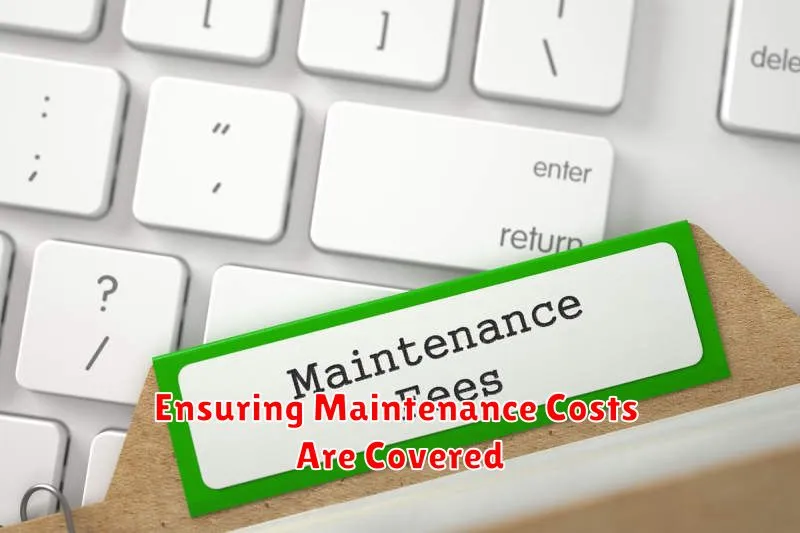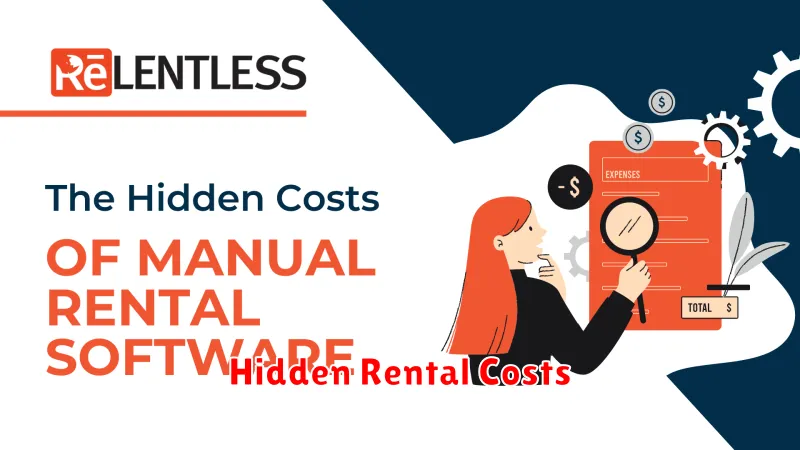Are you planning to rent a boarding house? Finding the perfect place can be exciting, but beware! Many hidden costs can sneak up on you, turning your budget upside down. This article reveals the common hidden fees in boarding house rentals and provides practical tips on how to avoid them, ensuring a smooth and financially stress-free move. Learn how to save money and secure a truly affordable boarding house rental experience!
Introduction: Understanding Hidden Rental Fees
Finding the perfect boarding house can be exciting, but it’s crucial to understand that the advertised rent price isn’t always the final cost. Many boarding houses incorporate hidden fees that can significantly inflate your overall expenses. These unexpected charges can range from seemingly minor administrative fees to substantial utility surcharges.
These hidden costs can be frustrating and even financially burdensome, especially for those on a tight budget. Understanding what these fees might entail is the first step towards avoiding them. This often includes thoroughly reviewing the lease agreement and asking direct questions to the landlord or property manager before signing any paperwork.
This article will guide you through common hidden fees in boarding house rentals, helping you identify potential pitfalls and equipping you with the knowledge to negotiate fair terms and avoid unexpected financial strain. By being informed and proactive, you can ensure a smooth and financially responsible boarding house experience. Understanding these potential costs upfront can save you significant money and stress down the line.
Common Hidden Costs in Boarding House Rentals

Finding the perfect boarding house can be exciting, but unexpected costs can quickly dampen the enthusiasm. Understanding these hidden expenses beforehand is crucial to budgeting effectively. Here are some common hidden costs to watch out for:
Utility Bills: While some boarding houses include utilities in the rent, many don’t. Electricity, gas, water, and internet are common expenses that can significantly add to your monthly outlay. Always clarify what’s included and what’s not before signing a lease.
Cleaning Fees: Some boarding houses charge extra for cleaning services, either on a regular basis or upon move-out. Inquire about the cleaning policy and any associated fees to avoid surprises later.
Damage Deposits and Key Fees: Security deposits are standard, but be aware of any additional fees for keys, remotes, or other items provided. Ensure you understand the terms and conditions for getting your deposit back.
Pet Fees: If you have a pet, expect additional fees. Some boarding houses may have pet rent or a one-time pet fee. Always confirm pet policies before committing to a rental.
Parking Fees: Depending on the location, parking might be an added cost. If parking is essential, inquire about availability and associated fees upfront.
Late Fees: Be aware of any late payment penalties. Understanding the grace period and the amount of the late fee will help you avoid incurring these extra charges.
Administrative Fees: Some boarding houses may charge administrative fees for lease processing or other services. These fees can vary widely.
By carefully reviewing the lease agreement and asking clarifying questions, you can avoid many of these hidden costs and ensure a smoother and more financially predictable boarding house experience. Don’t hesitate to negotiate or seek clarification on any ambiguous points.
How to Clarify Rental Agreements with Landlords
Before signing any boarding house rental agreement, it’s crucial to clarify all aspects with your landlord to avoid unexpected costs. Don’t hesitate to ask questions; it’s your right as a tenant.
Read the entire agreement carefully. Pay close attention to clauses regarding utilities, maintenance responsibilities, and any additional fees. If anything is unclear, don’t sign until it’s clarified.
Specifically inquire about utility costs. Will utilities be included in your rent, or are they separate? If separate, get a detailed breakdown of estimated costs for each utility (electricity, water, gas, internet).
Understand the terms regarding repairs and maintenance. Who is responsible for what? What process should be followed if something breaks down? A clear understanding prevents disputes later.
Ask about any additional fees. Are there cleaning fees, late payment penalties, or administrative charges? Inquire about the amounts and circumstances under which these fees apply.
Get everything in writing. Once you’ve clarified everything with your landlord, ensure all agreements, including details about utilities and fees, are documented in writing and included in, or appended to, the rental agreement.
Consider seeking independent legal advice. If the agreement is complex or you feel unsure about any aspect, consulting a lawyer or tenant rights organization can provide valuable guidance and ensure your rights are protected.
Tips for Avoiding Extra Utility Fees
Understanding your utility responsibilities is crucial when renting a boarding house. Many landlords include utilities in the rent, but others don’t. Clarify upfront whether water, electricity, gas, internet, and trash are included, or if you’ll be responsible for paying them separately. Get this in writing, either in the lease or a separate agreement.
If utilities are not included, inquire about the average monthly cost for each utility. This will help you budget effectively and avoid unexpected expenses. Consider comparing rates from different providers to ensure you’re getting the best deal. Be aware of potential surcharges or minimum usage fees that might apply.
Carefully review your lease. Look for clauses that detail your responsibilities regarding utility payments, meter readings, and reporting issues. Understanding these details prevents misunderstandings and potential disputes later. Don’t hesitate to ask your landlord to clarify any confusing aspects of the lease.
Before moving in, take meter readings for all utilities you are responsible for. Compare these readings to the readings at the end of your tenancy to ensure you are only paying for the utilities you actually consumed. This helps avoid any disputes over excessive charges.
Finally, maintain a record of all utility bills and payments. Keep copies of your bills and payment confirmations. This documentation can be invaluable in case of any disputes or discrepancies with your landlord.
Ensuring Maintenance Costs Are Covered

One of the biggest hidden costs in boarding house rentals is unexpected maintenance. To avoid being caught off guard, carefully consider how maintenance expenses will be handled before signing a lease.
Clearly define responsibilities in your lease agreement. Specify who is responsible for what repairs – the landlord, the tenant, or a shared responsibility. For example, who handles minor repairs like a leaky faucet versus major repairs like a roof replacement? A detailed breakdown prevents disputes later on.
Establish a maintenance fund. Consider including a clause in the lease agreement for a shared maintenance fund where tenants contribute a set amount monthly towards potential repairs. This proactive approach prevents unexpected large bills from impacting tenants individually.
Regular inspections are crucial. Schedule routine inspections with the landlord to identify and address minor issues before they escalate into expensive problems. Early detection saves both time and money.
Transparency is key. Ensure your lease agreement clearly states the process for reporting maintenance issues and the timeline for repairs. Knowing how things will be handled provides peace of mind and helps prevent disputes.
By proactively addressing maintenance costs through clear agreements and a shared responsibility, you can significantly reduce the risk of hidden expenses and ensure a smoother rental experience for everyone involved.
How to Avoid Move-In and Move-Out Charges
Boarding houses often levy unexpected fees during move-in and move-out. To avoid these, meticulously review your lease agreement. Understand all clauses regarding cleaning, repairs, and damages.
Before moving in, conduct a thorough inspection with the landlord, documenting any pre-existing damage with photos and signatures. This crucial step protects you from being held responsible for pre-existing issues.
During your tenancy, maintain the property in good condition. Address minor repairs promptly to prevent them from escalating into costly issues. This proactive approach minimizes the chances of charges upon move-out.
When moving out, schedule a final walkthrough with the landlord. This allows you to address any concerns together and document the condition of the property. Ensure you understand the cleaning requirements stipulated in your lease and adhere to them strictly. Take photos of the cleaned property as additional proof of your efforts.
By being proactive, documenting everything, and maintaining open communication with your landlord, you can significantly reduce the risk of unexpected move-in and move-out charges.
Negotiating Transparent Rent Terms
Negotiating clear rent terms is crucial to avoiding hidden costs in boarding house rentals. Before signing any agreement, explicitly discuss all costs involved.
Ensure the rental agreement clearly states the monthly rent, including any applicable taxes or service charges. Don’t hesitate to ask for a detailed breakdown of all fees.
Clarify the payment schedule and any penalties for late payments. Discuss whether the rent includes utilities (water, electricity, gas, internet) or if these are separate costs. If separate, obtain a detailed estimate of these utilities to budget effectively.
Negotiate a clear policy regarding repairs and maintenance. Who is responsible for what? Get this documented in writing to avoid disputes later.
Discuss the lease term and renewal process. Understand the conditions for renewal and any potential rent increases. Always get everything in writing and review it carefully before signing.
By being proactive and asking specific questions, you can avoid unexpected expenses and ensure a fair and transparent rental agreement. Remember, a well-defined agreement protects both you and the landlord.
Conclusion: Keeping Your Boarding House Budget Under Control
Successfully navigating the world of boarding house rentals requires vigilance. By proactively addressing potential hidden costs, such as utility bills, maintenance fees, and unexpected repairs, you can significantly improve your budgeting accuracy. Remember to thoroughly review the lease agreement, ask clarifying questions, and don’t hesitate to negotiate.
Careful planning and open communication with your landlord are key to avoiding unpleasant financial surprises. Creating a realistic budget that incorporates all potential expenses—both obvious and hidden—will help you maintain financial control and ensure a stress-free boarding house experience. Proactive budgeting and careful consideration of all potential costs will allow you to enjoy your living space without worrying about unexpected financial strain.
Ultimately, understanding the intricacies of boarding house costs empowers you to make informed decisions and secure a comfortable and affordable living arrangement. Take the time to understand your lease, ask questions, and plan ahead. The effort will pay off in peace of mind and a healthier bank account.

